Blues Reviews
Dec 2018/Jan 2019
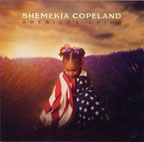 Shemekia
Copeland
Shemekia
Copeland
America’s Child
shemekiacopeland.com
Alligator Records Alligator.com
Shemekia Copeland started her career as a true Blues Princess, singing
with her father Johnny Copeland while still a child. With the passing
of Koko Taylor she humbly took on the mantle of Queen Of The Blues but
like any artist she’s been on a search for her own identity. On
recent recordings she’s added sacred steel guitar and covered Bob
Dylan and John Fogerty but on her newest recording “America’s
Child” she’s gone full-Americana with Nashville ace producer
Will Kimbrough as band leader. Kimbrough takes on guitar and organ duties
with his band, Lex Price on bass and Pete Abbott drums along with a host
of sidemen and sidewomen including country legends Al Perkins and Paul
Franklin on pedal steel guitar, Legendary Shack Shaker J. D. Wilkes on
harmonica, Carolina Chocolate Drops Rhiannon Giddens on African banjo,
Kenny Sears’ fiddle while Shemekia provides her strong blues voice
throughout. Half of the dozen songs are co-written by longtime manager
John Hahn, two with Will Kimbrough, two with Hahn and Mary Gauthier, one
Hahn and Oliver Wood and one with Hahn and The Morrison Brothers. Shemekia
has said “country music ain’t nothin’ but the blues
with a twang” and this American child is out to prove it.
Shemekia presents a message front and center with Kimbrough’s “Ain’t
Got Time For Hate” adding Perkins’ pedal steel guitar, J.
D. Wilkes harmonica and an eight piece vocal choir while Will’s
“Would You Take My Blood” is stripped back to just the trio
as she reaches out across this divided nation. Continuing their message
of unity, Paul Franklin’s pedal steel guitar whines over a marching
rhythm with Mary Gauthier, Emmylou Harris and Katie Pruitt singing the
chorus as Shemekia runs through a roster of characters on Gauthier’s
“Americans.” With the light touch of Giddens’ banjo
and sparkle of Will’s National Guitar, Shemekia’s vocals quiver
as she recalls simpler times with “Smoked Ham and Peaches”
then she goes out honky tonking on the Morrison Brothers’ “The
Wrong Idea” as Kenny Sears’ fiddle joins mid whirl. Al Perkins’
pedal steel has a seductive sway of a Mexicali ballad heating up as Shemekia
sings, “Such A Pretty Flame.” Singing from her heart Shemekia
covers her father’s “Promised Myself” led by Steve Cropper’s
guitar. The plodding insistence of John Prine’s “Great Rain”
features a duet with the man himself then things pick up force with “In
The Blood Of The Blues” and “One I Love” by rocker Kevin
Gorden as Wilkes’ harmonica brings it to a whirling conclusion.
The Kinks’ “I’m Not Like Everybody Else” is just
Copeland and Kimbrough’s slashing guitar before the rhythm section
slips in midway. The gentle guitar intro by Kimbrough fades behind Copeland
as she sings the traditional lullaby “Go To Sleepy Little Baby”
a cappella.
Shemekia sings of love and hope and acceptance because as brothers and
sisters we are all “America’s Child” —Roger &
Margaret White
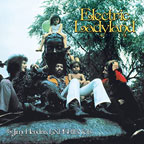 Jimi
Hendrix Experience
Jimi
Hendrix Experience
Electric Ladyland
Experience Hendrix/ Legacy
Originally issued on October 15, 1968, the third and final studio album
by the Experience to be released in Hendrix’s lifetime, Electric
Ladyland, is the originator of such imaginative tracks as “Crosstown
Traffic,” “All Along The Watchtower,” “Burning
Of The Midnight Oil,” “Voodoo Child (Slight Return”
and my favorite—the lengthy, presciently moody yet somehow enchanting
“1983....(A Merman I Should Turn To Be).” The first album
to be produced and directed by Hendrix himself, it is the most fully realized,
robustly cohesive project of his entire brief career. The sole Hendrix
LP to reach # 1 on the Billboard charts, it went a long way toward demonstrating
his capability as a singer/songwriter, guitarist (particularly guitarist!)
and producer. This celebratory, 3CD/1 Blu-ray box set features a 5.1 Surround
Sound remix by Eddie Kramer of the original album (that is astounding),
a CD of Early Takes for the album, another CD of the band recorded live
at the Hollywood Bowl a month before the album’s release and an
86 minute expanded Blu-ray documentary The Making Of Electric Ladyland,
with in-studio footage and interviews with Chas Chandler, Mitch Mitchell
and Noel Redding. The deluxe edition contains a full color 48-page hardcover
book with handwritten lyrics and poems, label instructions and never before
seen photos from the sessions. The real treat here is the recently discovered
amateur tape recording of the Hollywood Bowl concert. As a Los Angeles
Times journalist commented: “Hendrix embodies rebellion on stage
and manages to distill the primitive sensuality of a decade’s worth
of rock performances into a one-hour show.” ‘Nuff said.—Gary
von Tersch
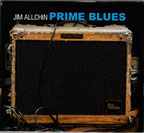 Jim
Allchin
Jim
Allchin
Prime Blues
Sandy Key Music 2018
No surprise that many consider music and mathematics intimately related,
as represented by music’s often complex rhythms and the intricate
interplay of voice and multiple instruments. Jim Allchin embraces and
embodies that duality. A musician since his teens, for almost five decades
he has created an impressive resume by combining his enduring musical
passion with a successful career as a mathematician and computer scientist.
After two serious health scares, he retired from his career as a Microsoft
executive and continues to pursue the blues with this, his fifth album.
The set is again supervised by noted producer Tom Hambridge, who wields
the drums and shares writing credit on eleven of the fourteen songs. Glenn
Worf gives sturdy bass support, as do rhythm guitarists Rob McNelly (a
fine player in his own right) and Bob Britt, and keyboard wizard Kevin
McKendree takes over that role ably fulfilled by Reese Wynans on Allchin’s
prior outing, 2017’s “Decisions.” In addition, we get
to enjoy the famed Memphis Horns. Mike Zito weighs in with vocals on one
track, as does octogenarian legend Bobby Rush. Rush also plies his under-recognized
harmonica prowess. Allchin, of course, provides lead guitar and almost
all of the vocals.
Allchin knows his blues and can demonstrate his own style while acknowledging
those of his antecedents. “Devil Don’t Sleep,” for example,
opens with a couple of notes a la Albert King, and almost immediately
morphs into Jimi Hendrix mode. McKendree furnishes pithy swirling organ
backdrop as Allchin strings single notes in the high register interspersed
with crunchy chords, a recurring motif throughout the set. Allchin‘s
lead guitar and Worf’s insistent walking bass open the shortest
track, the instrumental “Jimmy’s Boogie,” with Hambridge
soon entering with rapid-fire drum flourishes and Allchin then showing
how fast he can produce cascades of single notes. Almost halfway through
the set, the tempo slows with “Summer Sunrise,” a ballad that
showcases the Memphis Horns and ends with some poignant lead guitar. Next,
noted guitarist and producer Zito makes his appearance with a nice vocal
on the rollicking rocker “Enough Is Enough.”
After a shuffle, “Found the Blues,” Allchin goes Albert King
style again on the longest track, “Two Bad Dreams,” Bobby
Rush delivering the raspy, compelling vocal. Restraint is present on “Pawn
Shop Man,” a country-style blues with effective acoustic guitar,
great backing vocals, and really nice tinkly piano. McKendree shines again
on the piano on the ensuing shuffle, “Lost My Mind.” “Up
to Destiny,” penned solely by Allchin, is another slow blues evoking
the ethereal style of early Fleetwood Mac and its guitarist Peter Green.
“Tech Blues” and “Logoff” obviously give a lyrical
nod to Allchin’s computer past, the former augmented by Rush on
harmonica.
A caveat: Allchin’s singing is the weak aspect of the album. His
thin and reedy tenor has limited power, and exhibits strain when he reaches
beyond his comfortable range. However, “Prime Blues” effectively
displays Allchin’s instrumental expertise as he mostly controls
his penchant for furious fretboard fusillades and dishes out tunes with
a crew of skilled colleagues.—Steve Daniels
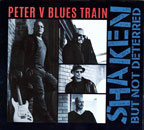 Peter
V Blues Train
Peter
V Blues Train
Shaken Not Deterred
Self-produced 2018
This quartet of blues rockers hails from the Philadelphia, PA, area; guitarist,
singer, composer, and bandleader Peter Veteska has been allied for five
years now with Sean Graverson on bass, Alex D’Agnese on drums, and
Aron Gornish on keyboards. On this, the band’s fourth CD, they are
augmented by Jeff Levine on organ and Danny Walsh on saxophone, with several
other adept musicians sitting in on a few numbers each. Clocking in at
an even one hour, the set gives its money’s worth.
The opening track, “I Don’t Wanna Leave Memphis,” displays
the band’s strengths immediately. The beat is catchy, the rhythm
section lays down a solid groove, and Peter V intersperses pithy guitar
lines with Levine’s swirling B3 backing. The shuffle groove is maintained
but slowed a little on “Blue Monday,” penned by New Orleans
legend Dave Bartholomew. “By the River” ups the intensity,
with some snazzy syncopated drumming by D’Agnese. It’s followed
by the r&b ballad “For All We Know,” Walsh wailing plaintively
on sax; and then the band delves into funk territory with “In Demand.”
Liner notes allege that “T-Bone Shuffle” is one of the seven
(or eight, it’s not clear) of these thirteen tunes that were penned
by Peter V, but Aaron “T-Bone” Walker may be rolling over
in his grave in consternation because this sure sounds like a cover of
Walker’s classic tune. Never mind; we’re onto “Alibi,”
introduced by some stinging bars of guitar and some of Peter’s better
vocalizing. (Kudos to Joanne Cesario, his partner in life as well as music,
who is credited with the lyrics of this and the other original songs.)
The ensuing rocker, “Don’t Cheat on My Lady,” reveals
the band at its best, all cylinders meshing with nice guitar, organ, and
piano solos. Soon after we’re treated to “Getting Closer to
You,” featuring guest soprano Vanessa Vause singing solo and then
dueting with Peter, Gary Neuwirth chiming in as well on harmonica. The
horn-driven “Been So Long” lets Peter loose to do some jazzy
blues vamping on guitar in conversation with sax and organ. The penultimate
track is the title tune, which presents a challenge to Veteska’s
somewhat limited vocal range, which is exposed again on the bonus finisher,
a cover of Big Maceo Merriweather’s “Worried Life Blues.”
The nice sax accompaniment and Peter’s obvious commitment to the
song’s emotional message nonetheless carry it off.—Steve Daniels
 Jonathon
Long
Jonathon
Long
Jonathon Long
www.jonathonlongmusic.com/
Wild Heart Records
www.wildheartrecords.com
Jonathon Long won the 2011 Guitar Center “King of the Blues”
award as Jonathon ‘Boogie’ Long, his Facebook is JonBoogieLong
and his web site used to be JonathonBoogieLong.com but with his new CD
“Jonathon Long” he’s left all that behind. Now we’re
not saying Jonathon’s lost his Boogie, this Baton Rouge, Louisiana
native has made himself into the blues man of his wildest dreams, and
as he nears his thirtieth year he’s gotten serious about his blues.
Joined by fellow young blues phenomenon, Samantha Fish, they have produced
and made “Jonathon Long” the debut release for her own Wild
Heart Records. Recorded in New Orleans right after Mardi Gras, with Long
on vocals and guitars, his rhythm section Jullian Civello drums and Chris
Roberts bass as Fish adds her own guitar and sparing vocals on a few tunes.
Starting slow with an acoustic country ballad “Shine Your Love,”
his warm vocals dominate with an organ-like shimmer that creeps into the
background till the guitar unleashes a ripping solo and his rousing vocals
power through. Keeping in a country vein the moaning fiddle of Michael
Harvey empowers Long’s rich vocals on “The Light” that
favor an Aaron Neville-like quiver as he supplies his own vocal harmonies
while Fish adds a bit of vocal sweetener. The only cover, “The River,”
written by Kenny Tudrick, has a haunting reverberating slide with a drone-like
vibration of a snare and features a vocal duet with Fish. Hitting a striking
southern rock tale of middle class warfare, in today’s economy you’re
either rich or you’re “Living The Blues” with a solo
reminiscent of Dickie Betts, before taking a more soulful turn on “That’s
What I Know” amidst light swashes of barely audible turntables.
Then jumping into some harder rock with a kick of testosterone Long’s
hoping to meet that “Natural Girl” ‘with a tan and a
pretty white smile.’ Then with a jazzy sway, a smooth Boz Scaggs-like
vocal and a sound similar to a Rhodes piano, Long must face “Where
Love Went Wrong.” Taking a woozy near-theatrical feel to this barroom
odyssey “Pour Another Drink” is driven by the slippery glide
of Jonathon’s vocals with a touch of gypsy jazz. “This Road”
takes several turns veering from a harder rock edge lightened by the cool
driving vocals as slide guitar ratchets up and glides back down. The grind
of heavy guitar and forceful vocal is in deep contrast to the lyrics pleading
“Pray For Me” with a screaming solo that abruptly drop to
a tinny acoustic with crickets as his rhythm as he fades away and with
“Bury Me” Long hopes that people will “remember me through
the words of my song.”
“Jonathon Long” has expanded his blues horizons with a little
country and southern rock but whatever genre Jonathon sings it’s
all straight from the heart.—Roger & Margaret White
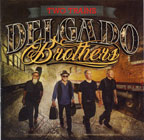 Delgado
Brothers
Delgado
Brothers
Two Trains
delgadobrothers.com
Bell Asher Records www.bellasher.com/
The Delgado Brothers are a real band of brothers and have been a working
unit since the mid 70’s with younger brothers renewing the line
up. The current group is elder brother Bob on bass, middle brother Joey
on guitar and backing vocals, younger brother Steve on drums and lead
vocals with ‘brother’ David B. Kelley on vintage Hammond B3.
They’ve been fiercely independent, self-financing their own Bell
Asher Records and studio run by brother Joey D. In 2016 the Delgado Brothers
won the International Blues Challenge and Joey took “The Albert
King Award for Best Guitarist.” This impelled them to record their
fourth CD, “Two Trains,” which they crowdfunded on YouTube.
All songs were written, performed and produced by The Delgado Brothers
with Ramon Banda and Ishmael Pineda sitting in on percussion and Theresa
James & The Rhythm Tramps adding backing vocals.
The Delgados have a refreshing tinge of the early Santana sound with B3
and percussion but it’s brother Steve’s vocals and lyrics
that drive this band right from the opener, ‘we can’t wait
for another day, the time is now’ so “Live For Today.”
It’s the type of positive message that runs throughout this CD.
Taut guitar and tightly regimented drums against a cool, relaxed narrative
that “Two Trains” “can’t run on the same line”
as the guitar drives the message forward. A soulful love song and one
of the best vocal tracks advancing the irony of its title “If Only
I Could Sing” with Joey’s harmony adds to its sweetness. Everything
is in motion spinning the “Circle Of Friends” that may end
but a circle of “family whose love never bends.” The music
shimmers and flows on “The River” regarding the plight of
the homeless, “will I survive another day, or will they take my
home away, I never dreamed I’d live this way,” with somber
vocal he begs “Talk To Me” as the guitar slowly builds to
a gentle scream. The growling guitar and yearning vocal invoke Los Lobos
reflecting on “450 Mulberry (I Won’t Forget)” where
Martin Luther King lost his life, then drifting between Little Feat and
Los Lobos, “Things Have Changed” has painfully honest lyrics
“does it matter if I’m gay or straight, will that change the
way you feel for me” asking for acceptance and going deep with “Explore
Your Mind” since “if you’re homeless or a wealthy man….we
realize we are all the same.” The sweet vocal harmonies of brother
Steve and Teresa James on “Ohana Tennessee” make the effortless
guitar picking into a place called home as “Inspiration” carries
it to completion on uplifting energy as the guitar skips joyfully along.
A lot of heart and soul has been poured into this CD and “Two Trains”
may be the record the Delgado Brothers have waited their entire lives
to make. —Roger & Margaret White
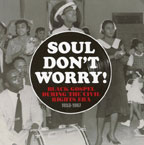 Various
Artists
Various
Artists
Soul Don’t Worry:
Black Gospel During The Civil Rights Era 1953-1967
Narro Way Records Pn-1602
www.gospelfriend.com
Prefacing the fact-packed, image-laden thirty-page booklet that accompanies
this invigorating, civil rights-themed 2CD project are these more-relevant-now-than-ever
lines from 1963 by the Georgia-based Sensational Linsey Singers: “This
could be a better world in which we live in/ If we could only forget the
color of our own skin.” Amen. As producer/ liners author Per Notini
puts it, “Although gospel songs had been sold in sheet music form
since the 1930s, it was not until the 1950s that Black gospel was mentioned
as a music style with a recognized market value.” Notini perceptively
continues: “When possible, the record producer purposely steered
the artist’s choice of songs and style of performance to achieve
a commercial, catchy sound such as “the walking rhythm” of
the Pilgrim Travelers or “the folk gospel” of the Staples
Singers and the R&B infused style of the Mighty Clouds of Joy and
the Violinaires.” The 47 artists presented here veer from the unaffected
and unpolished to the urbane and refined in a variety of musical styles
that have elements of ragtime, rhythm & blues, blues, rap, jazz, rock
‘n roll, doo-wop and Western art music in their delivery. Likewise,
all types of ensembles appear including male quartets, female groups,
mixed groups, soloists as well as choirs. As Notini further notes: “The
program mixes storefront groups with artists fit for the concert stage.”
Disc one begins with Inez Andrews, who matriculated from Albertina Walker’s
famous Caravans to form her own group in the early 1960s, with her ardent
“Sing A Song” and closes with the legendary Mahalia Jackson’s
reflective, doo-wop-tinged “Consider Me,” accompanied by her
Melody Echoes quartet and a bluesy guitarist. Along the way, arresting
performances abound—from the Caravans (with James Cleveland and
Albertina Walker) with the traditional “Steal Away” and the
Drinkard Singers (with Cissy Houston) on the standard “You Can’t
Make Me Doubt Him” to Tampa, Florida’s Little Junior &
the Butler-Aires with their heartfelt commentary on JFK’s assassination
titled “Jackie, Don’t You Weep” and South Carolina’s
Friendly Four quartet—with their urgently lively “What Is
Freedom.” Disc two continues with social topics to the fore as the
Ramparts (with “Scatman” Crothers on lead vocal), tell the
tragic tale of “The Death Of Emmett Till” while the obscure
Southern Bells weigh in with their accusatory original “Viet Nam,”
Richmond, California’s Melody Kings offer the tempest-tossed “I’m
Going To Walk Through The Streets,“ Ohio’s Trumpets Of Joy
transfix with their grief-stricken “The News That Shook The World”
and Alabama’s Professor Charles Taylor with his dynamic “I
Woke Up This Morning.” Other favorites feature Clara Ward (“Peace
Be Still”), the Staple Singers (Standing At The Bedside Of A Neighbor”),
Sister O.M. Terrell (“The Gambling Man”) and James Lowe’s
“The Lord Will Make A Way Somehow.” Amen.—Gary von Tersch
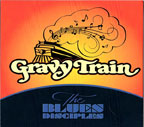 The
Blues Disciples
The
Blues Disciples
Gravy Train
Self-released 2018
Only seventy-five miles from the home of Chicago blues, Milwaukee, Wisconsin,
is no blues desert. An Internet search yields the names of over a dozen
active blues bands in the greater Milwaukee area. One impressive group
is The Blues Disciples, who have been purveying their brand of gritty
blues for almost three decades. Only their third release, “Gravy
Train” confirms their reputation as a classy representative of the
genre.
Founded by vocalist and harmonica player Jim “Barefoot Jimmy”
Schwarz, the group is completed by guitarist Paul Stilin, drummer Dave
Cornette, bassist Karl Dvornik, organist Chris Lehnert, and vocalist Erica
Johnson. Jack Naus on trumpet and Tom Sobel on saxophones augment the
sextet, and a slew of guest musicians make appearances, including lauded
Midwest pianist Jimmy Voegeli and Billy Flynn, one of the best session
guitarists anywhere.
In fact, it’s Flynn’s and Stilin’s guitars that quickly
join the horns as the more than hour-long set blasts off with “Ten
More Days.” This basic twelve bar opener wraps pithy guitar solos
around Schwarz’s gritty singing, telegraphing what’s to come.
Schwarz penned the song, and is credited for doing so on eleven of the
thirteen tunes. Schwarz’s lyrics are clever throughout, as suggested
by the title of one of my favorite tracks, “Right Woman at the Wrong
Time.” The song is an upbeat shuffle goosed to life by Voegeli’s
tinkly piano and the insistent drumming of Cornette, who lends vocal harmony
as well.
The two tracks not composed by Schwarz are credited to Erica Johnson.
The first, “That Feeling,” is a slow soul blues introduced
by Schwarz’s plaintive, pure-tone harmonica and buttressed by the
horns. “Trying to Stay in Love,” Johnson’s other composition,
hews to the same format, with some excellent jazzy single note guitar
fills (both Flynn and Stilin contribute; individual leads are not identified).
Johnson provides two other vocals, including nice duets with Schwarz on
“Twenty Two Children” and “Hey Baby”; the latter
is a danceable shuffle with nice walking bass by Mark Anderson.
The set closes with the title track, a blues rocker that concludes this
lengthy album of Chicago and soul blues with a zesty flourish. Now we
know that Milwaukee produces more than just notable beer.—Steve
Daniels
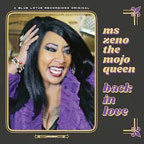 Ms.
Zeno The Mojo Queen
Ms.
Zeno The Mojo Queen
Back In Love
Blue Lotus CD
www.bluelotusrecordings.com
Another stellar, high quality project from St. Louis’ Blue Lotus
imprint featuring the dynamic Memphis powerhouse singer Ms. Verlinda Zeno.
Originally from tiny Natchitoches, Louisiana, the ebullient Zeno has been
based in Memphis for the last three decades or so, earning her legendary
sobriquet in club appearances on world famous Beale Street while traveling
the globe and sharing the stage with the likes of B.B. King, Leon Russell,
Ann Peebles, Albert King, Johnny Winter and Isaac Hayes, among others.
Discovered by Little Milton in 1989 and recruited for his Angels backup
group, Zeno began her solo career shortly thereafter and hasn’t
looked back. Here she’s accompanied by some of the area’s
first-call musicians—including Blue Lotus label owner and multi-instrumentalist
Paul Niehaus, guitarist Little G Weevil, harp whiz Brandon Santini and
live-wire trumpeter Dustin Shrum on a dozen accomplished co-writes—titles
like the bluesy portrait of one rascally “Willie Brown, a testifying
masterpiece called “Love Is Like A Flower,” the autobiographical
title track and “Rise Up”—a gospel-framed message that
folks these days should take to heart—are particularly stunning.
An assertive “Gotta Get Paid,” a back-door classic called
“Mistress,” the earnestly conversational ballad “That’s
How I Know” (that perfectly captures that classic Memphis-cured
soul sound) and the ruminative closing track “Father Time”
also impress. And then there’s the bawdy, Bobby Rush-lively “Hot
Sauce.” Should be a breakout album for the talented Ms. Zeno who
certainly sounds like she’d deliver a great live show as well.—Gary
von Tersch
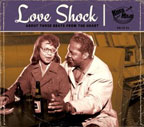
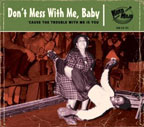 Various
Artists
Various
Artists
Love Shock:
About Those Beats From The Heart
Koko-Mojo CD
Various Artists
Don’t Mess With Me Baby:
‘Cause The Trouble With Me Is You
Koko-Mojo CD
www.koko-mojo.com
Koko Mojo is a branch of Rockstar Records, part of ex-Bear Family boss
Richard Weize’s new endeavor. This ongoing series is craftily assembled
by be-turbaned DJ Lil Victor AKA “The Mojo Man,” with each
issue themed and featuring 28 tracks that proffer a plethora of blues,
rhythm ‘n‘ blues and black rock ‘n’ roll rarities
from the 1950’s and early 1960’s. While other discs in the
series hone in on drinking, harp players, novelties or guitarists, Don’t
Mess focuses on the ins and outs of the male/female relationship and features
quite a few well known artists—with Bullmoose Jackson advising his
baby to “Watch My Signals” and Mickey Baker (as Big Red McHouston)
complaining “I’m Tired” to Joe Houston, who awakens
to an empty bed on “I Woke Up This Morning” (from an old Tops
budget LP), as well as pair of fantastic, early Little Willie John sides—“Leave
My Kitten Alone” and “”Look What You’ve Done To
Me.” A bevy of virtual unknowns also surprise, with Cliff Chambers
and his politically incorrect “Don’t Talk Back,” a torrid
recall of Little Richard’s “Keep A Knockin’“ by
one Rufus Brown, Jesse Allen trying to slow his baby down on the raucous
“Take It Easy,” Alonzo Tucker wondering “What’s
Wrong” while Baker Knight wants his baby to “Bring My Cadillac
Back” and Doc Starkes has the same problem with “Women And
Cadillacs.
“Love Shock is more of the same with Teddy “Mr. Bear”
McRae extolling the charms of his “Hi Fi Baby,” Jesse Perkins
needing just “One More Kiss,” Crown Prince Waterford wailing
“Get Your Clothes & Let’s Go,” Ray Johnson encouraging
his baby to “Shake A Little Bit” (“You’re too
young to have the blues so rock your little soul”), Frankie Lucas
pleading “I Want To Rock You Baby” and Little Sonny is not
complaining about his “Love Shock.” Other flashback crackers
encompass “29 Ways” by John Little John, Harold Burrage’s
inventive “You K.O.’D Me,” Peppermint Harris praising
his “Angel Child,” a sax-honking “Flyin’ Home
To My Baby” by Dorian Burton and a hopping “Lovey Dovey Lovey
One” by Junior Wells. Also noted is Al Reed bragging about his “Top
Notch Grade A Baby,” Elmar Parker & The Light Lighters (?) admiring
his gal’s gait on “I Like The Way You Walk,” Andre “Jail
Bait” Williams excitedly proclaiming “Hey Country Girl,”
Sax Kari bragging about his dynamite “Chocolate Fizz” and
Gene Burks, doing likewise about his “Shirley Jean.” These
are well produced digi-pak sets with period graphics but no liners, session
or release details aside from noting the label, where known. I would advise
picking these up pronto—CDs like these vanish fast.—Gary von
Tersch
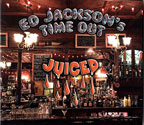 Ed
Jackson’s Time Out
Ed
Jackson’s Time Out
Juiced
Self-produced 2018
The Michael Packer Blues Band, a lauded fixture of the New York blues
scene for almost four decades, lost its guitarist-bandleader when Packer
died in 2017. However, the band has persevered under its new moniker,
with Ed Jackson now handling vocal duties. The remainder of the band is
comprised of John Becton on bass, Adam Valk on guitar, Guy Powell on drums,
and Linda Pino on vocals. “Juiced” presents ten songs delivering
its particular brand of blues and soul.
“Here We Are Back at the Bar” and “Bold” two similar
upbeat numbers, jump-start the set, followed by “My Heart Is Blue
for You,” a slightly slower tune inaugurated by a few bars of deep-toned
Becton bass. Valk strums the intro to the cover of “Love Me Like
a Man,” Pino impressively entering the festivities in lieu of Jackson
on vocal, and Valk reappearing with a nasty mid-song solo. Valk demonstrates
his licks again on “Since You Put That Bottle Down,” Jackson
resuming the vocalizing.
“Fields of Sorrow” belies its title with its jaunty, infectious
approach, some intriguing tempo variances, and one of Jackson’s
best singing endeavors. The ensuing “On the Bench” reverts
to the principal rhythmic groove, found in the opening two tracks, with
which the band seems most comfortable. The band lays back a little on
the next tune, “Your Love Is Like Whiskey,” which is followed
by “Oh How I Wish It Would Rain,” wherein Jackson’s
melismatic singing is augmented by the harmonizing of the Adobe Blues
Bar Tones. The set concludes with its longest track, a six minute cover
of Jimmy Reed’s “Big Boss Man,” the sinuous quality
of Reed’s version morphed into a shuffle with a mid-track rock-guitar
solo.
Liner notes are sparse; neither the obvious cover songs nor the remainder
are given composer credits. Song lengths are not specified. Several of
Valk’s solos shine, and the rhythm section is steady. Jackson’s
vocals may elicit differing views: despite their reedy timbre, limited
range, and occasional errant pitch, they effectively communicate emotional
conviction. Kudos to the band for keeping Michael Packer’s durable
legacy alive.—Steve Daniels
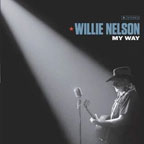 Willie
Nelson
Willie
Nelson
My Way
Legacy Recordings CD
This is Willie’s second new studio album this year, following his
well-received Last Man Standing in April. Here he casually swings his
way through eleven standards and classics popularized by Frank Sinatra,
moving from the airy intoxication of falling in love to the crushing hangover
of heartbreak on such reincarnations as “Fly Me To The Moon,”
“Young At Heart,” “One More For My Baby (And One More
For The Road)“ and “It Was A Very Good Year.” Recorded
in the style and spirit of Willie’s groundbreaking 1978 Stardust
album and 2016’s Summertime: Willie Nelson Sings Gershwin (that
won a Grammy) and buttressed by a covey of lush string and horn arrangements,
Willie lovingly pays tribute to one of his heroes and close friends—in
the 1980s, Sinatra opened for him at the Golden Nugget in Las Vegas. As
Willie comments in a recent AARP interview: “I learned a lot about
phrasing from Frank. He didn’t worry about behind the beat or in
front of the beat, or whatever—he could sing it either way, and
that’s the feel you have to have.” Precisely the attitude
that Willie brings to this engaging project with further enduring covers
like “Fly Me To The Moon,” “Summer Wind,” “What
Is This Thing Called Love” (a duet with 9 time Grammy Winner Norah
Jones), “A Foggy Day” and the anthem-like title track—one
accomplished vocalist intriguingly channeling another. Treat yourself.—Gary
von Tersch
 David
Julia
David
Julia
Inspired
www.davidjuliamusic.com
Vizztone Label Group
www.vizztone.com
The dreams of young men at seventeen are not always grounded in reality,
but David Julia’s dream to live the life of a blues musician is
as real as it gets. David understands it’s hard work that makes
dreams come true, from his first paying gig at ten, to working the jams
on the Legendary Blues Cruise and competing in the International Blues
Challenge, he impressed Bob Margolin so much he signed Julia to his own
Vizztone Records. Produced and recorded by Mike Zito at his Marz Studio
in Nederland, Texas it features David Julia on guitar and vocals, Eliot
Keys B3 organ, Lonnie Trevino Jr. bass, Matt Johnson drums and Lewis Stephens
on piano playing six original compositions plus five covers. To his credit
he’s remained humble enough to call his new CD “Inspired”
for all the players who have inspired him.
Leading with his originals, “Hey There Sally” has a sprightly
playful intro with a relaxed yearning vocal as the lead chases the rhythm.
Two ballads follow, the B3 sighing behind a strong but mellow vocal on
“If Only” as light single note leads trail after each line
while the power ballad “Throw Me A Rope” may be a plea for
redemption from one of his teachers as his cries are heard through David’s
blazing guitar. “Don’t Get Me Going” taking a hip hop
attitude as David raps his teenage dream of asking a girl for a dance
at a Saturday night gig and “Sunshine Boogie” is a country-tinged
instrumental romp. Following with some inspired covers, one of David’s
first heroes, Tab Benoit, whose “Nice And Warm” flares with
a burst of Albert King-like guitar as the vocals go deeper and dream of
home. Quieting to a restrained but forceful vocal on Michael Burks’
“Empty Promises” as his guitar dives into darker territory
while a tougher echoing voice emerges on JP Soars “Something Ain’t
Right” as the drums rock harder and an angry guitar runs a scathing
gauntlet. Downshifting to a gentle loping rhythm with swaggering vocal
against frolicking lead on Albert Castiglia’s “Keep Her Around
Too Long” and to finish that affair David takes Matt Schofield’s
“Clean Break,” his vocal is phrased like a very young Rick
Estrin as the B3 trades licks with David’s guitar till it breaks
free with a wail of freedom. As a conclusion Mike Zito joins Julia for
dueling acoustic guitars on “You Don’t Need No Shelter”
the two alternating the verses with Zito adding a deeper vocal as the
two easily trade guitar lick and choruses.
For a young man on the verge of manhood, David Julia’s first major
label recording is a mature undertaking, you could say truly “Inspired.”—Roger
& Margaret White
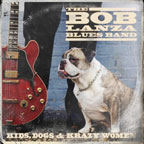 The
Bob Lanza Blues Band
The
Bob Lanza Blues Band
Kids, Dogs & Krazy Women
Connor Ray Music CD
As the press sheet accurately notes: “This CD will stoke your mojo
for old school rhythm & blues as co-producers Anthony Krizan and Lanza
make a formidable team on this recording, blending swampy blues and roots
music effortlessly.” Lanza has been active on the New Jersey blues
scene for years and adds: “Yeah, I didn’t bring too much to
Anthony’s SonicBoom Studio because between our guitars and amplifiers
we have some of the finest vintage gear around. Including, but not limited
to ‘60s Neve pre-amps, Olympic modules, two old Gibson amps and
a rare 1964 Super Reverb while, guitar-wise, there’s Lanza’s
1966 Gibson 345 and his 1968 thin line Telecaster along with band mate
Krizan’s TV yellow 1960 Les Paul Special (responsible for some great
slide work on the leadoff title track) along with some vintage Telecasters.
Other picks, on an album full of them, include a downbeat testimonial
from a bar stool titled “Not The Man I Use To Be (For Jersey Boy)”;
an easy loping cover of the ‘50s oldie “Walking After Midnight,”
a tempo-shifting raver called “Full Time Lover “ (underpinned
lightly and politely by John Ginty’s marvelous Hammond B3 organ
work); a jumping tribute to the late harmonica master James Cotton (with
slicing harp work by drummer Vin Mott); an after-midnite-and-all-alone
blues “Every Side Of Lonesome” and, probably my favorite track—the
set-closing, hauntingly elegiac instrumental “Raritan River Stomp.”
Well worth tracking down.—Gary von Tersch
 2019
Blues Calendar/Cd
2019
Blues Calendar/Cd
Blues Images
BluesImages.com
For the sixteenth year in a row, John Tefteller’s dedicated Blues
Images outfit has once again released their “Classic Blues Artwork
From The 1920s” calendar with CD package certain to attract devotees
and historians of the blues as well as those interested in graphic arts
and advertising material from a century ago, much of it originally emanating
from Paramount Records. This year’s disc has 23 tracks, including
a pair of recently unearthed titles by Mississippi Blues legend William
Harris (“I’m A Roamin’ Gambler”/ “I Was
Born In The Country—Raised In Town”) and a quality re-master
of Charlie Patton’s haunting gospel masterpiece, “Oh Death,”
recorded with his wife Bertha Lee in New York City on Wednesday, January
31, 1934. Other riveting gems include Lottie Kimbrough’s impassioned
back porch testimonial “Don’t Speak To Me”; Memphis
Minnie’s “hot guitar and romping vocals” on her touching
tribute to the recently deceased “Ma Rainey”; both sides of
Post War blues artist Papa George Lightfoot’s recently uncovered
debut disc ( a descriptive “Winding Ball Blues” b/w the X-rated
“Snake Hipping Daddy”); a great sounding pair of obscure Blind
Lemon Jefferson titles ( “Piney Woods Money Mama” (great cover
choice!) b/w “Low Down Mojo Blues,” an eerie number called
“Indian Squaw Blues” by one Freezone (“he done been
here and gone”), an unreleased one-sided Paramount test pressing
by the infamous Beale Street Sheiks called “Jumping On The Hill”
and the “ramblin’ and gamblin’“ Charles Nelson’s
tale of losing his money playing a proto-gin rummy card game—so
he’s got the “Coon Can Blues.” Also noted are two atmospheric
gospel sides by Sam Butler AKA “Bo Weavil” Jackson—the
optimistic “Christians Fight On (Your Time Ain’t Long)“
and “Heaven Is My View” to cite only a few from the generously
tracked disc. Makes me wish a year was only six months long...—Gary
von Tersch
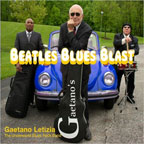 Gaetano
Letizia & The Underworld Blues Rock Band
Gaetano
Letizia & The Underworld Blues Rock Band
Beatles Blues Blast
Self-released
www.gaetano@gaetanoletizia.com
Born in Cleveland in 1951 and inspired by the likes of B.B. King, Muddy
Waters and Albert King, Letizia was performing as a teenager—an
early stage appearance had him sitting in for the James Gang’s Joe
Walsh—and he’s been at it ever since. As Letizia explains
in his brief liners: “Yo Beatles fans, in case you didn’t
know it, the fab four were originally a blues band as were so many of
the famous British invasion bands. Well, we decided to take them back
where they came from and make their magical music bluesy again.”
With his partners in crime, drummer Mike D’Elia and bassist Lenny
Gray, Letizia proffers a rowdy romp through through 17 classic tunes from
the Beatles catalog, quite cleverly arranged and re-framed as a lo-fi
funky, rocking blues jam session. Favorite numbers include an in-the groove
version of Abbey Road’s “Come Together,” the novelty
song with a great riff “Birthday,” a swamp blues-accented
“Do It In The Road” along with “Yesterday”—re-imagined
as a cushiony blues rhumba. A Latin-suffused “And I Love Her”
reflects a 1970s Santana sound while “Can’t Buy Me Love”
recalls the exuberantly gritty Chicago blues and not to overlook their
recall of “She Came In Through The Bathroom Window” that recalls
Joe Cocker’s impassioned version. Also noted are crafty revisions
of a couple of George Harrison gems—“Taxman” benefits
from a Texas shuffle treatment while “My Guitar Gently Weeps”
glidingly shifts between a samba and a power ballad. That rare concept
project that works Two thumbs up!—Gary von Tersch
Home
/ Blues Blogs /
Artist Links / Blues
Links / Videos / Store
Subscribe / Advertise
/ Back Issues
/ Contact / Staff